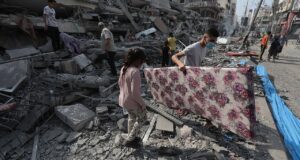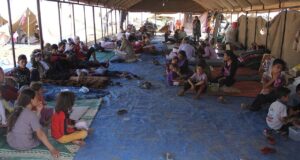By John Slinger – Senior Fellow
12th June 2013, Human Rights and Conflict Resolution, Issue 2, No. 3.
This post is about our Senior Fellow’s visit to the Domiz refugee camp in the Kurdistan Region of Iraq, during a four day visit to the region from Friday 31 May – Tuesday 4 June
Two experiences stand out from my recent visit to the Kurdistan Region in Iraq: meeting refugees fleeing Syria at the Domiz refugee camp; and seeing a weeping son uncovering the body of his father, Mohammed Serspi, murdered by Saddam Hussein’s regime in the 1980s. The first, a biblical tide of innocent humans cast out by a vicious dictator in 2013. The second is a single example from a multitude of evil which continues to wreak its effect decades on. The factor uniting these two experiences is Iraqi Kurdistan itself, whose very existence as a prosperous, free, secular place, and whose tragic history, shows just why dictators must be challenged.
Whilst visiting the Domiz refugee camp, I shared David Cameron’s pride in Britain’s commitment to overseas aid. As well as support from DFID, tents provided by British NGO ShelterBox in partnership with Rotary International, are providing much needed shelter. The camp’s director explained how the Kurdistan Regional Government (KRG), in conjunction with UNHCR and NGOs, are caring for a staggering 130,000, many of them at Domiz. The KRG Foreign Minister told us that his government needs more assistance from the outside world.
The families at Domiz are just like yours or mine. Their only misfortune was living in Assad’s Syria. It is impossible to look into their eyes and believe that refugee camps are enough. Just as Bosnia showed, offering humanitarian assistance and safe havens is a necessary but wholly insufficient response to tyranny. It can mean feeding today those who fall victim to a murderous regime tomorrow.
Back in the late 1980s when Saddam Hussein was terrorising Iraq’s civilians, and his genocide against the Kurds was reaching its peak with the vicious Anfal campaign, the international community did nothing. It deliberately and shamefully ignored his numerous chemical weapons and other attacks in order to maintain trade and contain Iran. It was only after we removed Saddam from Kuwait and had encouraged the Shias and Kurds to rise up, that John Major took the brave decision in 1991 to impose a No Fly Zone. The Kurds still remember this with huge gratitude. Ultimately, we did what was morally right, irrespective of our immediate national or strategic interests.
But countless people died before we acted. People like Mohammed Serspi, a primary school teacher who was arrested in Erbil on May 28 1988, and who was murdered by the regime a month later and buried in an unmarked mass grave on the outskirts of the city. His son’s grief was etched onto his face as he told us that his father had never progressed professionally, because he had refused to join the Ba’ath Party. The family only discovered the grave’s location after the secret police station was ransacked in 1991. He’d built a wall to mark the grave’s location and only now was it being painstakingly unearthed, a bone discovered as we watched. Saddam’s regime had sought to eradicate not only his life, but his body and his name. The distraught son said: “for 22 years Kurdistan has been free, but I have not been free”. I told him that we would tell his story.
Had it not been for our military intervention, first in 1991 and later in 2003, Saddam would have continued his genocide and there would have been countless more victims like Mohammed Serspi. Without the West choosing action over inaction, the Kurds would not have enjoyed the protection from Saddam’s military that enabled them to build a democratic, open society with the prosperity and strength to enable them to shoulder their responsibilities towards Syria’s refugees.
And so full circle. The Kurdistan Region of Iraq, freed from the yoke of Ba’athist dictatorship, is now sheltering those fleeing another Ba’athist dictator, whose actions, as before, but for different reasons, the world chooses to tolerate. In Syria, we can’t even manage a No Fly Zone of the kind that allowed the Kurds to prosper. Our leaders implore us that any action in Syria must be ‘legal’, and therefore that Russia’s veto blocks action. Yet the No Fly Zone over Iraq never received specific UN Security Council authorisation, proving that doing the right thing and ‘international law’ are not necessarily synonymous.
The world is pursuing a variation of its favourite foreign ‘policy’ of ‘active inaction’. This stance has failed so many innocent people, so often before in places such as Darfur, Rwanda, Bosnia, Democratic Republic of Congo and Iraq. We are applying humanitarian and diplomatic sticking plasters while the patient bleeds to death. Yet the energy and empathy on display at Domiz and the sympathy shown to Mr Serspi’s son, shows that people want to do the right thing. The expression of our common humanity must not stop at the gates of refugee camps, beside mass graves or in endless UN or EU meetings. It must be applied to stopping the causes of such crimes in the first place, by military means if necessary. If not, people twenty years from now will be visiting Syria, witnessing the uncovering of mass graves and writing articles such as this, bemoaning that in 2033, ‘international community’ and ‘human rights’ remain little more than words.
This post was also published by Spectator Coffee House blog on 10 June and Wall Street Journal on 11 June.
The next Spectator Debate on 24 June will be debating the motion ‘Assad is a war criminal. The West must intervene in Syria’ with Malcolm Rifkind, Andrew Green, Douglas Murray and more. Click here to book tickets.
SLINGERBLOG // @JohnSlinger
John Singler is contactable at:
John.Slinger@hscentre.org
Please cite this article as:
Slinger, J. (2013) ‘A Mass Grave and a Refugee Camp for Syrians – Iraqi Kurdistan teaches that Military Intervention can work’. Human Security Centre, Human Rights and Conflict Resolution, Issue 2, No. 3.
 Human Security Centre Human Rights and International Security Research
Human Security Centre Human Rights and International Security Research



